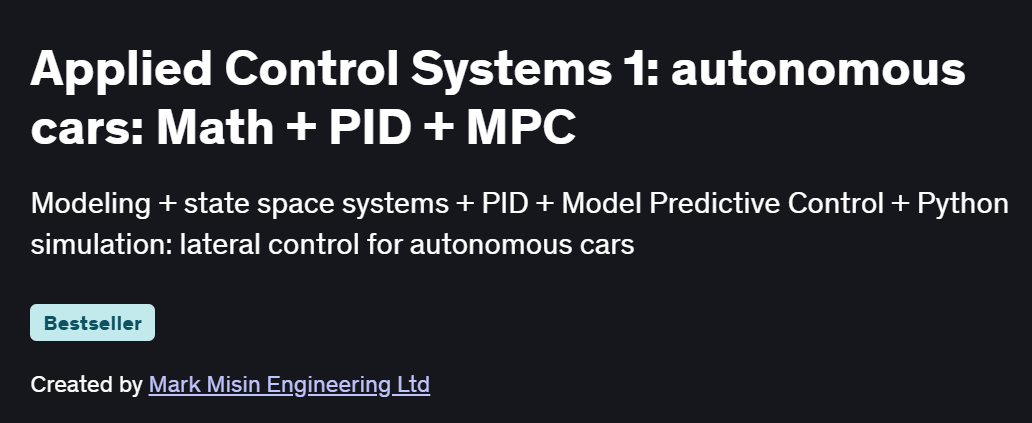What will you in Applied Control Systems 1: autonomous cars: Math + PID + MPC Course
Formulate mathematical models of dynamic systems using transfer functions and state-space
Design and tune classical PID controllers for stable, responsive system behavior
Implement model predictive control (MPC) to handle multi-variable constraints and optimize performance
Analyze system stability, time- and frequency-domain responses, and robustness margins
Simulate control strategies in MATLAB/Simulink and translate them to real-world applications
Program Overview
Module 1: Dynamic System Modelling
⏳ 45 minutes
Deriving transfer functions from first- and second-order physical systems
Building state-space representations and converting between forms
Module 2: Time- and Frequency-Domain Analysis
⏳ 1 hour
Step, impulse, and bode plot analysis for system characterization
Poles, zeros, and stability criteria (Routh, Nyquist, and root locus)
Module 3: PID Control Fundamentals
⏳ 1 hour
Proportional, integral, and derivative actions—effects on rise time, overshoot, and steady-state error
Closed-loop tuning methods: Ziegler–Nichols, Cohen–Coon, and manual tuning
Module 4: Advanced PID Implementation
⏳ 45 minutes
Anti-windup strategies, filter design, and implementation in discrete time
Handling noise, saturation, and non-ideal actuator dynamics
Module 5: Introduction to Model Predictive Control (MPC)
⏳ 1 hour
MPC theory: prediction horizon, control horizon, and cost function formulation
Constraint handling on inputs, states, and outputs
Module 6: MPC Design & Simulation
⏳ 1 hour
Setting up MPC controllers in MATLAB/Simulink with built-in toolboxes
Case studies: multivariable process, temperature control, and constrained tracking
Module 7: Robustness & Performance Evaluation
⏳ 45 minutes
Sensitivity functions, gain and phase margins, and worst-case disturbance rejection
Comparative analysis: PID vs. MPC in practical scenarios
Module 8: Real-World Applications & Code Deployment
⏳ 45 minutes
Generating C/C++ code from Simulink for embedded deployment
Hardware-in-the-loop testing and integration tips
Get certificate
Job Outlook
- Control systems expertise is essential for roles in automation, robotics, aerospace, and process industries
- High demand for engineers skilled in PID and MPC to optimize manufacturing, energy, and vehicle systems
- Opportunities as Control Engineer, Automation Specialist, and Mechatronics Engineer
- Provides a foundation for advanced careers in process control, autonomous systems, and industrial IoT
Explore More Learning Paths
Advance your control systems and autonomous vehicle knowledge with these related courses and resources. These learning paths will help you understand vehicle dynamics, control algorithms, and mobility technologies.
Related Courses
Electric Vehicles and Mobility
Learn the principles of electric vehicle systems, sustainable transportation technologies, and modern mobility solutions.Applied Computational Fluid Dynamics
Explore fluid dynamics simulations critical for vehicle aerodynamics and design optimization.Applications in Engineering Mechanics
Understand how core engineering mechanics principles are applied in real-world vehicle and system design.
Related Reading
What Is Project Management
Discover how project management skills ensure the successful execution of complex engineering and automotive projects.
Specification: Applied Control Systems 1: autonomous cars: Math + PID + MPC Course
|





